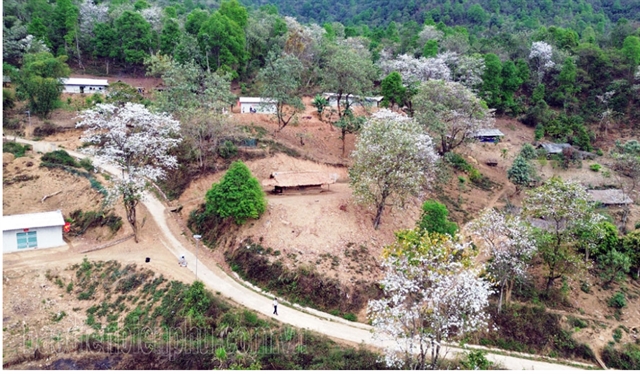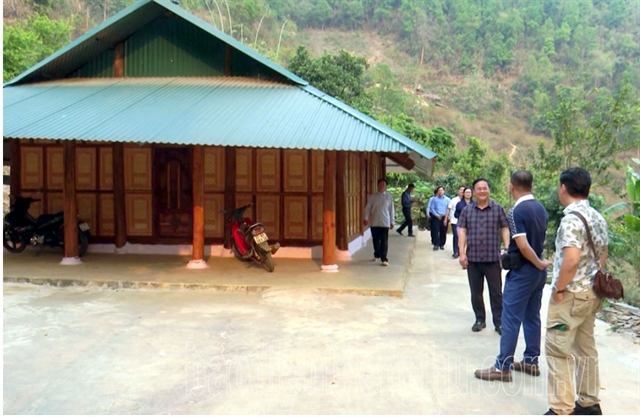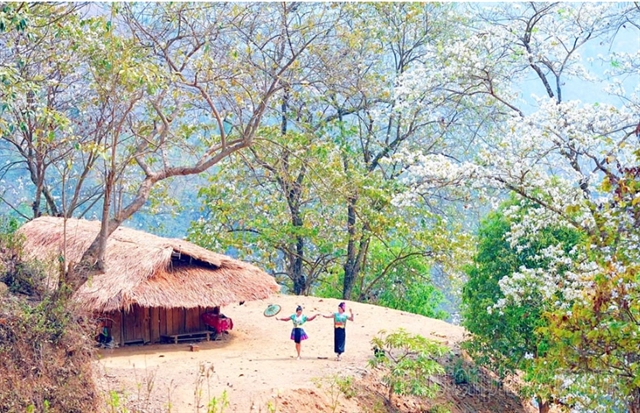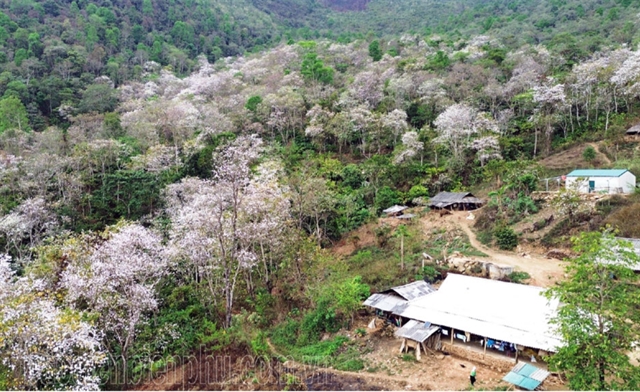Điện Biên boosts community tourism potentials in Nậm Cứm Village
Culture - Ngày đăng : 16:34, 22/05/2024
Điện Biên boosts community tourism potentials in Nậm Cứm Village
Surrounded by more than 1,200 'hoa ban' (bauhinia) trees of many years old, Nặm Cứm Village is one of the rare villages in Mường Ảng District, Điện Biên Province that still retains the pristine and rustic beauty of a highland village.
 |
| Many 'ban' trees are grown among houses of ethnic Mông people in Nậm Cứm Village creating a unique beauty for the local area. VNS Photos Anh Nguyễn |
By Anh Nguyễn
ĐBP - The authorities of Mường Ảng District in Điện Biên Province have chosen Nậm Cứm Village as its first locality to develop community based tourism due to its unique beauty landscapes and rich ethnic culture.
Nậm Cứm Village in Ngối Cáy Commune is home to over 70 households, all of whom are Mông people.
Surrounded by more than 1,200 hoa ban (bauhinia) trees of many years old, it is one of the rare villages in Mường Ảng that still retains the pristine and rustic beauty of a highland village.
The Mường Ảng District has recently coordinated with various tourism authorities and organisations to conducted a survey of tourism potential in ethnic minority and mountainous areas in Nậm Cứm Village.
 |
| A survey team from the Asian Tourism Development Institute and Community Tourism Association visit Nậm Cứm Village |
The units participating in the survey include the Asian Tourism Development Institute, the Việt Nam Community Tourism Association, the Việt Nam Institute of Housing and Urban Development, the provincial Department of Culture, Sports and Tourism and experts in the field of tourism development and services
Through the survey, experts highly appreciated the natural beauty of the village and affirmed the potential and advantages of building and developing it into a community tourism destination.
There is a great potential to boost tourism products by focusing on cuisine, ethnic costumes, festivals, and experiences imbued with the traditional cultural identity of the Mông ethnic people, according to the surveyors.
 |
| Nậm Cứm Village still retains traditional houses of the Mông ethnic people. |
Mùa A Lầu, the village leader, said: "Agricultural production and animal husbandry are the main occupations of villagers so life still faces many difficulties. The poverty rate is high accounting for 95.3 per cent. Currently, the total food coverage per capita reaches 300kg of rice/person/year. Since the community tourism survey was conducted in the village, everyone have been very happy and excited. If a plan to be implemented, villagers will benefit and have the opportunity to increase their income."
Family heads and reputable villagers have also instructed their children to well implement the Party's guidelines and policies, the State's laws, and village rules to preserve and promote the local cultural identity.
Villagers regularly participate in cleaning village roads and planting flowers to create a green, clean, and beautiful landscape. Especially now, the village is focusing on protecting the ancient ban tree forest which is recognised as one of the highlights that attracts tourists.
 |
| The ancient 'ban' forest in NậmCứm from above. |
Nguyễn Tiến Đạt, Secretary of Mường Ảng District's Party Committee, said: "With available potential and advantages, the district determines to develop Nậm Cứm into the district's first community tourism village. In the coming time, the district is focusing on mobilising all resources to renovate and upgrade internal roads; set specific plans creating highlights and unique features for the village to attract visitors. The district also focuses on holding traditional festivals, embellishing and restoring ancient houses imbued with the traditions of the Mông people. At the same time, it will establish tour groups and learn from experiences of successful community tourism models inside and outside the province. The district is calling for investors and travel firms to boost linkage to lure more tourists to the area." VNS
